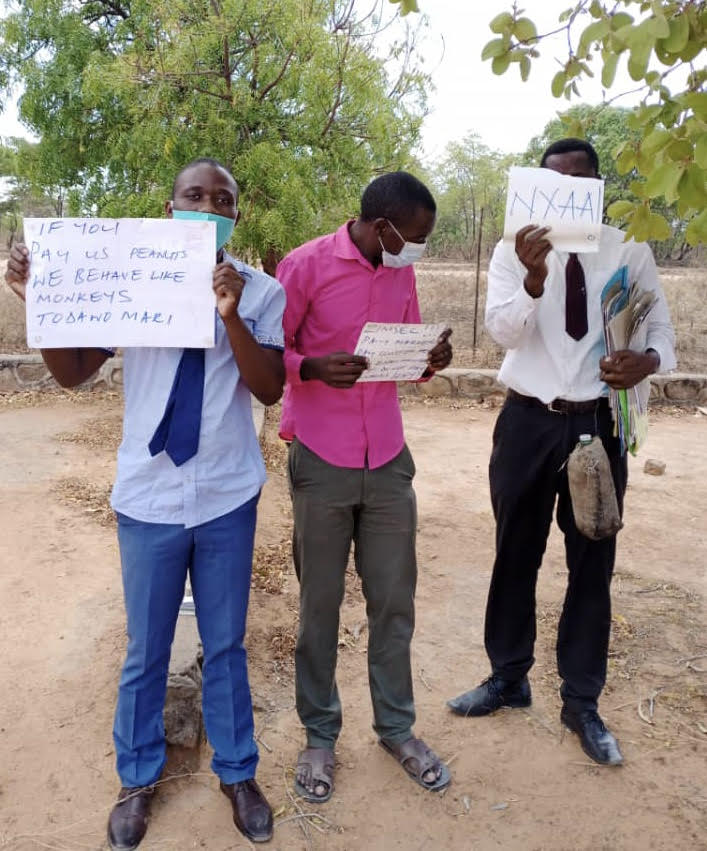The Amalgamated Rural Teachers Union of Zimbabwe (ARTUZ) says it has withdrawn its labour from schools starting from this Monday to the end of next week in a bid to push the government to review their salaries.
Teachers in Zimbabwe have been crying over working conditions that continue deteriorating while the government seems to be doing less to address their plight.
In 2018, teacher salaries were pegged at US$540 but are now earning wages in local RTGS currency that is often eroded by inflation and exchange rates.
However, the Ministry of Primary and Secondary Education has downplayed ARTUZ’s industrial action, saying the union commanded less support from teachers countrywide.
In an interview with CITE, ARTUZ president, Obert Masaraure said their withdrawal of labour was part of the justice for teachers campaign, which was a call for action where teachers were demanding their pre-2018 October salaries.
“This is the only way to save our education. In the next 12 days, from November 15 to 27, 2021, there will be no teaching. The first day has been a success as attendance dropped to 57 percent, we are moving from there and young people across the country have shown solidarity to our movement,” he said.
“If the government does not address our concerns, we will take our grievances to the ballot box and we don’t think they will like the consequences.”
Last week, the government announced that it will pay its restive employees United States Dollar-denominated bonuses.
The ARTUZ president said this decision was reached after extensive consultation with its members nationwide after observing the “continued reluctance by the employer to engage teachers and reviewing their pathetic and meagre salaries.”
“Communication of such has been shared with the membership, public, relevant stakeholders and the government. Teachers are suffering a lot and being continually ordered to sacrifice is an insult of the highest order and we will no longer be driven to the abyss of slavery and lack of recognition for the value of our work,” Masaraure said.
“To our membership and all progressive citizens from different sectors and walks of life, the moment is now to make a decisive action that will change the facet of the teaching profession. The momentum is on our side, the law is on our side and we should not be intimidated by an unfocused and uncaring parasitic employer who masquerades as a hero to everyone but in actual fact is just a sophisticated version of a slave regime.”
Masaraure encouraged people to support the teachers’ cause as they were justified to ask for better pay.
“Let us all add our voice through any forum or platform we can manage to utilise. Teachers do not attend your stations, parents keep your children away from schools from tomorrow and show solidarity to your teachers in every community you are in. The power of every society is through unity, solitary and against any oppressor, especially those who wield the levers of governance,” said the unionist.
“Teachers in Zimbabwe are not demanding El Dorado but are demanding a living wage in line with the agreement of the pre-2018 October salaries.”
Ministry of Primary and Secondary Education, Director Of Communications and Advocacy, Taungana Ndoro said 95 percent of teachers countrywide were still reporting for duty.
“How many members does ARTUZ have? Last time I checked they had about 380 teachers. They are very small and we have over 150 000 teachers in the country. The last reporting in the country showed over 95 percent of teachers were reporting for duty and ARTUZ numbers account for 0.006 percent,” he told CITE.
Ndoro noted that the ministry would take action on absent teachers.
“Obviously, the absence of teachers will affect lessons but we will take remedial action and the 95 percent reporting for work will cover the workload. We encourage them not to discourage the learners,” said the education ministry official.
“Teachers have grievances and issues of welfare are known and the government has a listening ear but if you say, ‘I want to withdraw because I want you to listen to me,’ you are negotiating in bad faith.”

